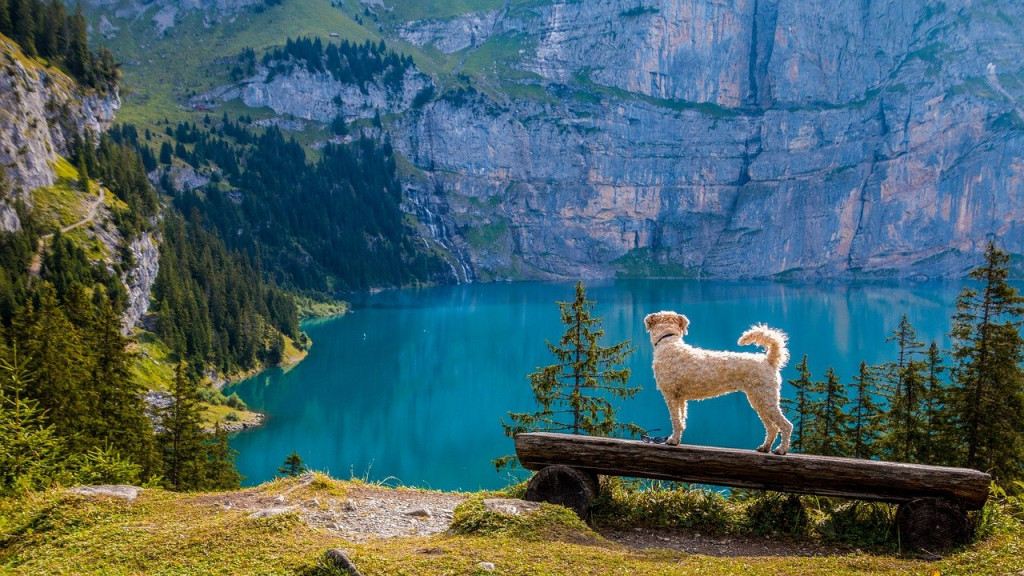
REMEMBER, YOU’RE ONLY A VISITOR
Parks of all types and sizes are meant to be visited and enjoyed. They are beautiful places to take in stunning views and see unique wildlife, but it is crucial to remember that they are also home to various animals and plants.
While on the trail, ensure you are respectful of the flora and fauna you may come in contact with. You should not feed them, tamper with their shelters or interfere in any other way. Keep your distance from nearby wildlife, and if you have pets with you, keep them on a leash and in control.
Keep in mind, you are only a guest in whatever woods you visit. While you may want to bring home a souvenir, it is best to avoid moving rocks, picking plants or flowers, or disturbing cultural or historical artifacts that may be present. It is crucial to leave the area the way you found it, ensuring people can enjoy its beauty for many years.
Being aware of your surroundings and trail and weather conditions helps you camp responsibly and will be important areas to consider during your preparation. Both are important concepts when your goal is to Leave No Trace.
STAY ON THE PATH
Part of being prepared is knowing your route like the back of your hand and sticking to it on the day of your hike. You may want to feel the thrill of creating your path, but you could end up hurting the environment you are trying so hard to enjoy.
Trampling through unmarked land could damage plants and compact the soil, making it more difficult for new life to grow. Eventually, the soil will erode, creating a less healthy environment for life to flourish. This damage can also have a much more significant impact on the surrounding ecosystem as it can destroy potential food sources for insects and animals.
During your hike, do your best to stay on the premade paths of sand, gravel, rock, snow or dry grass. Avoid walking on the sides of the trail.
Plus, unless you have your machete handy, you will have a much more challenging hike if you do not stay on the marked path, which could also lead to injury. During the planning stages of your trip, prepare your route and try not to deviate from it.
RESPECT OTHER HIKERS
Nature isn’t the only thing you’ll see on the dirt trails. You may meet a handful of fellow hikers trying to enjoy their surroundings, just like you. So, it’s crucial to show respect for these individuals as well. You don’t want to be the person who’s blasting loud music on a remote trail and ruining the peace and quiet for other hikers.
Following trail etiquette and doing your best to share the trail with all other users is a great place to start. Obey any posted rules, follow traditional rights of way, and orient rest spots or campsites away from the trail. Unless you are hiking in popular hunting areas, keep your clothing neutral, with plenty of browns, greens, tans or blacks to minimize any visual disruptions.
TAKE OUT WHAT YOU TAKE IN
You may have heard the phrase, “pack it in, pack it out.” While this may seem like a pretty obvious way to reduce your impact on nature, many people don’t follow this saying and leave all sorts of things lying around on the trail. It’s crucial to pack out all of your trash, food scraps, and other belongings after a long hike, ensuring you’re leaving the environment the way you found it.
If you need to do your business while out on the trail, make sure you dispose of it properly. Try to find a spot at least 200 feet away from any water sources and dig a cathole roughly six to eight inches deep. Some areas may not allow it, so make sure to read up on local guidelines.
You have likely been on a hike, walk, or camping trip when you saw trash and debris along the trail or in the campsites. Nothing takes you out of being in nature like seeing an empty chip bag or a crumpled beer can among the leaves and trees. In these situations, you should practice “negative trace,” or picking up what others leave behind. Sure, it might not be your responsibility, but consider it your moral duty to protect nature even when others might not.
Some fragile areas may legally require you to carry everything out, including toilet paper and human waste. While only some locations you visit will be that strict, it is best to get into the habit of carrying trash bags to store your garbage easily. It doesn’t have to be a hassle if you plan accordingly and bring the necessary equipment.
Packing out everything you bring in is an essential and very easy way to reduce your impact on nature.
